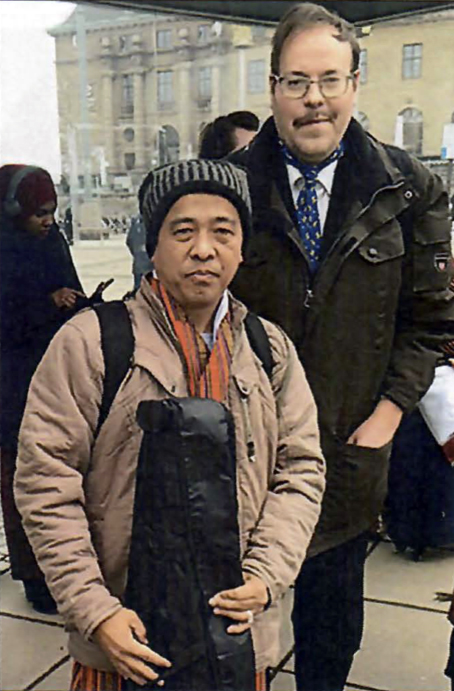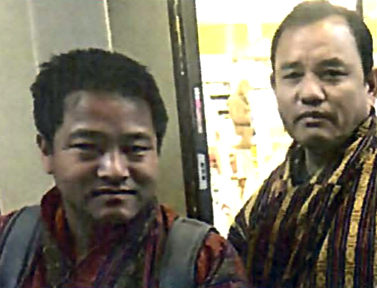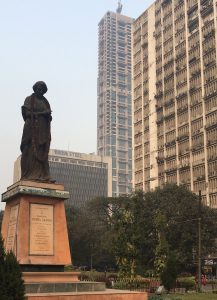Prison Diary by Kishorechandra Wangkhem
 In Outlook April 29 2019, Manipur journalist Kishorechandra Wangkhem, who was jailed, detained under the National Security Act (NSA) for critiziing the government, speaks out about detention, life in jail, democracy and personal freedom.He belongs to a small, unrecognised minority religion called Sanamahism, a pre-Hindu traditional ethnic stream. Barring a few, no civil organisation came out openly in condemnation of the government – ironical in a state known for the maximum number of civil organisations and mass movements against injustice. No Meira Paibis (women torch-bearers) were in sight outside his prison. None of that otherwise vocal element, students’ unions. Even the media fraternity disowned him. Read more…
In Outlook April 29 2019, Manipur journalist Kishorechandra Wangkhem, who was jailed, detained under the National Security Act (NSA) for critiziing the government, speaks out about detention, life in jail, democracy and personal freedom.He belongs to a small, unrecognised minority religion called Sanamahism, a pre-Hindu traditional ethnic stream. Barring a few, no civil organisation came out openly in condemnation of the government – ironical in a state known for the maximum number of civil organisations and mass movements against injustice. No Meira Paibis (women torch-bearers) were in sight outside his prison. None of that otherwise vocal element, students’ unions. Even the media fraternity disowned him. Read more…
Thanks for Karolinska-Aga Khan University long-standing collaboration
 The Division of Global Health at Karolinska Institutet Medical University in Stockholm focuses on health problems that are big in the world but small or non-existent in Sweden. Many know the division by its earlier acronym, IHCAR. It is part of the Department of Public Health Sciences. Since the start in 1984 it has developed extensive research in several fields within international health.
The Division of Global Health at Karolinska Institutet Medical University in Stockholm focuses on health problems that are big in the world but small or non-existent in Sweden. Many know the division by its earlier acronym, IHCAR. It is part of the Department of Public Health Sciences. Since the start in 1984 it has developed extensive research in several fields within international health.
This multidisciplinary division pursues research and education in collaboration with researchers in Europe, North and South America, Asia and Africa. Through the experience of collaboration with global partners and stakeholders, the division aims at being a resource centre at the Karolinska Institutet, recognized for its comprehension of global health issues. Extensive collaboration exists within Karolinska Institutet and the division is an active stakeholder in the Karolinska International Research and Training (KIRT) Program and the Centre for Global Health (KICGH). Read about The history of 60 years of KI research collaboration with Pakistan and India
IHCAR has practiced the successful sandwich PhD system for many years, that has resulted in a large number of theses by PhD candidates from among other third world countries, India, Pakistan and Bangladesh. A special relationship exists between KI and Aga Khan University (AKU) in Karachi, Pakistan, with research and research training collaboration going on since 1992. Nine of the faculty at AKU Karachi currently have PhDs from KI, all have returned to Karachi and three of them hold interim chairs. Read Bo Lindblad’s 2005 report on collaboration between KI and Aga Khan University.
PhDs at Karolinska Institutet has this far been achieved by 9 AKU faculty in a ”sandwich system”. Seven of these are still full time faculty at AKU. They are:
1. Zulfiqar Bhutta, Chair Maternal and Child Health
2. Junaid Razzak, Chair Medical Emergency
3. Fauziah Rabbani, Chair Community Health Sciences
4. Shahab Abid, Head Gastroenterology unit, Medicine
5. Farid-ul-Hasnain, Community Health Sciences
6. Tashfeen Ahmad, Orthopedic unit, Surgery
7. Tazeen Said Ali, School of Nursing
Karolinska Institutet Medical University in Stockholm has been involved in collaboration projects with Pakistan, and especially withAga Khan University (AKU) in Karachi, since the 1950’s. Professor Emeritus Bo Lindblad at IHCAR has been , .instrumental in much of these projects. Read his report on half a century of Kl-AKU collaboration
In March 2018, Aga Khan University sent an official letter thanking the President, Members of the Faculty and Members of the Administration of Kl for their interest in, support of and contribution to the old and still ongoing collaboration with Karolinska Institutet). In the document, it is mentioned that the collaboration has created research leaders, research groups, besides good will for Sweden and Kl and increased the research capacity within low-income areas of South Asia and East Africa. The PhD theses have been defended at Kl and the papers in them published. A list of total publications from the teams involved is available at AKU and a summary of the projects with results is being prepared at AKU.
Linnaeus Palme grant for Sweden-Bhutan exchange programme now running
 On 22 May 2018, the Swedish Council for Higher Education decided to award SEK 523 000 as a Linnaeus Palme Exchange Programme grant to the Department of Science, Environment and Society (NMS) at the University of Malmö for its new collaboration programme with Samtse College of Education (SCE) at the Royal University of Bhutan (RUB) during 2018. The authority is pleased to see that the application maintains a high quality, due to the work and dedication of the collaborating partners leading to achievement of our common goal of a higher quality of education. The project includes 12 approved numer of teacher and student mobilities.
On 22 May 2018, the Swedish Council for Higher Education decided to award SEK 523 000 as a Linnaeus Palme Exchange Programme grant to the Department of Science, Environment and Society (NMS) at the University of Malmö for its new collaboration programme with Samtse College of Education (SCE) at the Royal University of Bhutan (RUB) during 2018. The authority is pleased to see that the application maintains a high quality, due to the work and dedication of the collaborating partners leading to achievement of our common goal of a higher quality of education. The project includes 12 approved numer of teacher and student mobilities.
The aim of the Sweden-Bhutan project is to develop and support a more culturally responsive teaching and learning in mathematicsand mathematics teacher education in the Swedish and Bhutan school contexts. The new collaboration was facilitated by the NSAN editor Lars Eklund during a May 2017 visit to Samtse, when he discussed with Senior SCE Lecturer Purna Badadur Subba and Dr. Johan Westman, Swedish ethnomusicologist working at SCE since 2016, the possibility to find collaborating partners in Swedenon the isue of Ethnomathematics. Read Lars Eklund’s report from Samtse College of Education .
At Malmo University, Associate professor Annica Andersson happened to be working on Etnomathematics with a strong international network with scholars at teacher education institutions and universities in different parts of the world. Her thesis and research has been based on critical mathematical and ethnomathematical research. Together with Lena Andersson, senior lecturer and the international coordinator at the department, and with a background from the ITP/Sida programme”Child Rights, Classroom and School Management”, they form the Swedish coordination team.
In early February 2018, Prof. Subba and Dr. Westman from Samtse College of Education visited Malmö University and their counterparts at Malmo University to plan for the coming exchange programme. In Malmo, they also had a seminar on Bhutanese folk music at Lund University’s Faculty of Fine and Performing Art – located in Malm6. Besides they spent a few days in Gothenburg and Borås. Photo to the right from Gothenburg.

By chance, another group of four Bhutanese school teachers also visited Sweden and Gothenburg during the same period. It so happened that Båtsmansskolan in Härryda, outside Gothenburg, had successfully applied for another Swedish government funded exchange programme, the Atlas programme, for a collaboration with Samtse Lower Secondary School -located in the same small Bhutanese town as the College of Education.Atlas is a programme for schools and other educational institutions interested in global networking and practical training exchanges. This programme is also administered by the Swedish Council for Higher Education. More information .
The NSAN editor also played a certain role in creating the initial contact between the two schools in Samtse and Härryda, and Lars was therefore invited to meet the entire Bhutanese group in Gothenburg on Sunday 11 February .
In June 2018, the final approval of grant was decided upon, for a period of 8 years. This partnership programme is in between SCE at RUB, Bhutan and NMS at Malmö University ,Sweden. Purna and Johan expressed their sincere and heartfelt thanks to everyone whose support was crucial ( and received) for achieving this grant, including Lars Eklund.
